Readers of the World: Czech Republic
 We're continuing our reading round-the-world trip, discovering all about literary cultural customs, fascinating reading-related facts and all kinds of assorted and quite amazing stories of all kinds of pursuits in literature from the whole world over.
We're continuing our reading round-the-world trip, discovering all about literary cultural customs, fascinating reading-related facts and all kinds of assorted and quite amazing stories of all kinds of pursuits in literature from the whole world over.
A fortnight ago, Niall started our worldwide literature journey off by taking us all the way to Brazil; now we'll jump from South America over to Central Europe, as I'll be your tour guide for exploring the literary sights of the Czech Republic.
Before it became a popular stag and hen party hotspot, Prague – the capital city of the Czech Republic – was regarded for two quite famous literary exports. The first, a person: the author of many of the 20th century’s most notable novels and short stories, Franz Kafka, who was born in the city in 1883 (when it was still a part of pre WWI Austria-Hungary). The second, a book: The Unbearable Lightness of Being, written in 1984 by Milan Kundera. The novel immortalises Prague in the midst of what was one of the most difficult and significant times in the Czech Republic’s history – the Prague Spring of 1968, an attempt to reform Czech communism, of which Kundera himself was involved. Despite its title, the book may be considered anything but ‘light’ in its subject matter; dealing with the fate of the individual and suggesting that in the end, such a fate is meaningless as in an infinite universe the life of one person is insignificant – or as Kundera would put it, unbearably light.
Given this cheery philosophical outlook, it might be worth considering how best to spend an ultimately futile existence. Surely a pretty good way of going about things would be to soak up the contents of as many books as possible, as does one of the novel’s main characters, Franz (perhaps named after Kafka? Seems like a handy coincidence). Franzes both of the fictional and the Kafka variety would certainly be happy that they lived in a city containing such a historic, intricate and well-stocked library as the Strahov Monastery Library. Part of the Strahov Monastery, the library is 868 years old and has withstood such perils as fire and army invasion to hold over 16,000 books alongside 110,000 volumes of monastic writings – one of the oldest collections in the Czech Republic. With its beautiful and incredibly ornate Baroque interior and several special library rooms, the Strahov Monastery Library is as much of a tourist attraction as a library. Unfortunately given the rare and ancient quality of many of the books housed there, so much as a human breath would be likely to adversely affect their preservation; therefore most of the library is strictly off-limits to up close and personal inspection. You can however go on a virtual 360 degree tour of the library (also handy if you can’t afford the air fare to Prague).
Something that allows much wider access to literature for the Czech Republic’s readers – and those beyond - is the Libraries For All project. The Multicultural Center Prague is a partner in the project, which has the goal of upgrading local public libraries in the city (as well as also operating in Austria, Sweden and Germany) to ensure that they fully serve the needs of the Czech Republic’s migrant community. Libraries For All is working to make libraries in the Czech Republic truly multicultural, involving, diverse and democratic – an aim that Kundera with all his political activism would surely be proud of.
Share
Related Articles

Shared Reading in Wirral Libraries: ‘As a kid people read stories to you but as an adult you lose that – and it’s a fantastic thing to do!’
Two Strategic Librarians for Wirral Libraries, Kathleen McKean and Diane Mitchell have been working in partnership with the UK’s largest…

Open Air Cinema FAQ’s
If you were able to snap up tickets to our brand new Open Air Cinema, check below for any queries…

New Liverpool open air cinema brings movies to the Mansion
NEW FOR 2025: Eight handpicked films will hit the big screen in Calderstones Park this summer as national Shared Reading…



